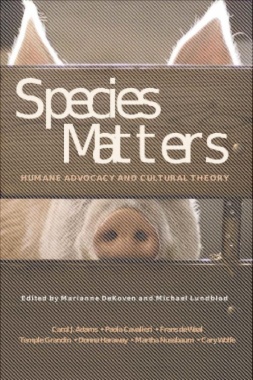Why has the academy struggled to link advocacy for animals to advocacy for various human groups? Within cultural studies, in which advocacy can take the form of a theoretical intervention, scholars have resisted arguments that add "species" to race, class, gender, sexuality, disability, and other human-identity categories as a site for critical analysis.
Species Matters considers whether cultural studies should pay more attention to animal advocacy and whether, in turn, animal studies should pay more attention to questions raised by cultural theory. The contributors to this volume explore these issues particularly in relation to the "humane" treatment of animals and various human groups and the implications, both theoretical and practical, of blurring the distinction between "the human" and "the animal." They address important questions raised by the history of representing humans as the only animal capable of acting humanely and provide a framework for reconsidering the nature of humane discourse, whether in theory, literary and cultural texts, or current advocacy movements outside of the academy.
- Contents
- Acknowledgments
- Introduction: Animality and Advocacy
- 1. Species Matters, Humane Advocacy: In the Promising Grip of Earthly Oxymorons
- 2. Humane Advocacy and the Humanities: The Very Idea
- 3. Consequences of Humanism, or, Advocating What?
- 4. Archaeology of a Humane Society: Animality, Savagery, Blackness
- 5. What Came Before The Sexual Politics of Meat: The Activist Roots of a Critical Theory
- 6. Compassion: Human and Animal
- 7. Down with Dualism! Two Millennia of Debate About Human Goodness
- Addendum to Down with Dualism! Two Millennia of Debate About Human Goodness (2010)
- 8. Avoid Being Abstract When Making Policies on the Welfare of Animals
- Contributors
- Index

